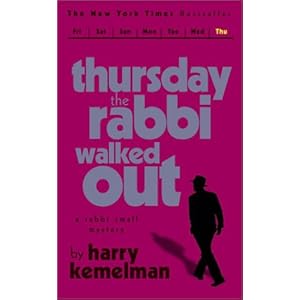
After seven books, I think that Kemelman could well have retired Rabbi David Small, and Thursday the Rabbi Walked Out has the feel of something working towards a conclusion. As it turned out, the author would write another four or five stories after this one, but the always entertaining Temple politics and arguments get pretty crazy this time out, and the question of whether David will still have a job at the end of the book - usually a foregone conclusion - is just as critical as who murdered the town miser, a grouchy anti-Semite who will be mourned by nobody.
I enjoyed this story as much as the first in the series, and despite a pile of hiding-in-plain-sight clues, had no idea who was behind the killing. I honestly don't know that a crime like this would fool an investigator from TV's CSI for a second, however. After I thought about it for a while, I found myself starting to question whether the faked evidence would have fooled the police even in a small, sleepy town in the mid-seventies. Either police methods have improved massively over the years, or the real cops in the seventies were content to let the decade's quirky detectives take all the glory in order to surprise real killers with the knowledge that actually, quirky TV detectives really aren't necessary when they have evidence teams who can see right through these carefully-orchestrated killings. It's the same way that there are at least three episodes of the original run of Columbo in which suspension of belief is similarly damaged by knowing that all the fun cat-and-mouse would have, in the real world, been busted by simple crime scene evidence.
Taken on its own terms, the story remains very fun, and I love the way that Kemelman is able to reflect the business of the Temple into the action, leaving Rabbi Small juggling so many different things. His inflexible position on matters related to Judaism sometimes seems a little baffling to me. I'm really uncertain why he refuses to perform Bar Mitzvah for an elderly man who was unable to have the ceremony at age thirteen. Saying that the ceremony is irrelevant, that the man is Bar Mitzvah regardless, makes sense, but is it that big a deal to him? Well, it's not like I've got any training in Talmudic reasoning. I'll take his word on it. Recommended.
No comments:
Post a Comment